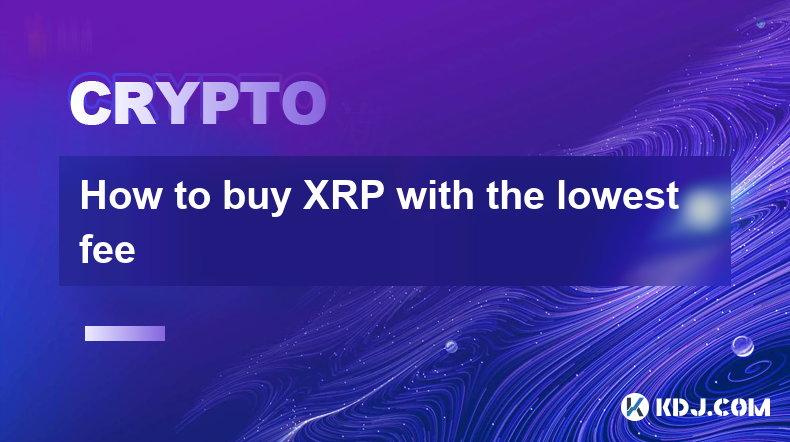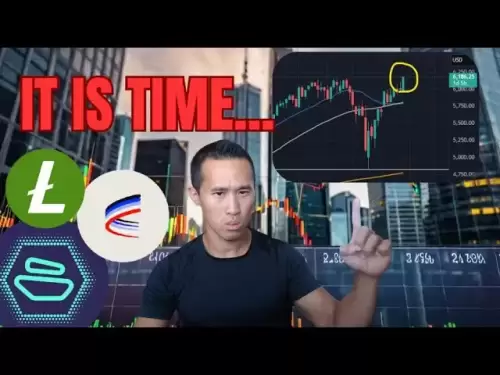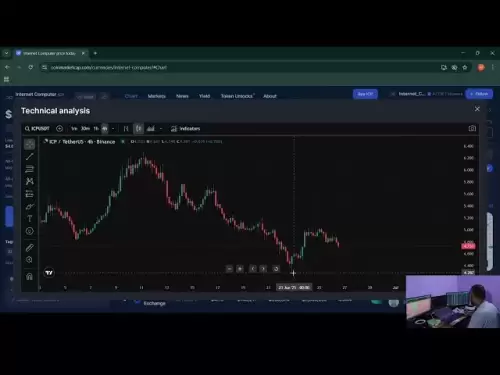-
 Bitcoin
Bitcoin $107,247.2038
-0.18% -
 Ethereum
Ethereum $2,424.7947
0.34% -
 Tether USDt
Tether USDt $1.0003
-0.02% -
 XRP
XRP $2.1171
-3.33% -
 BNB
BNB $645.6618
0.06% -
 Solana
Solana $141.5898
-1.32% -
 USDC
USDC $0.9998
0.00% -
 TRON
TRON $0.2710
-0.41% -
 Dogecoin
Dogecoin $0.1602
-2.99% -
 Cardano
Cardano $0.5553
-2.28% -
 Hyperliquid
Hyperliquid $36.3019
-2.42% -
 Bitcoin Cash
Bitcoin Cash $491.7212
2.04% -
 Chainlink
Chainlink $13.0810
-0.23% -
 Sui
Sui $2.6080
-5.06% -
 UNUS SED LEO
UNUS SED LEO $9.0040
-0.05% -
 Stellar
Stellar $0.2350
-3.06% -
 Avalanche
Avalanche $17.2294
-2.31% -
 Toncoin
Toncoin $2.8075
-1.05% -
 Shiba Inu
Shiba Inu $0.0...01121
-3.43% -
 Litecoin
Litecoin $84.2215
-0.32% -
 Hedera
Hedera $0.1429
-4.88% -
 Monero
Monero $312.2199
-0.90% -
 Dai
Dai $0.9997
-0.01% -
 Ethena USDe
Ethena USDe $0.9999
-0.02% -
 Polkadot
Polkadot $3.2973
-2.60% -
 Bitget Token
Bitget Token $4.4742
3.12% -
 Pi
Pi $0.5631
-10.10% -
 Uniswap
Uniswap $6.7817
-2.06% -
 Pepe
Pepe $0.0...09252
-3.74% -
 Aave
Aave $251.3830
-2.24%
How to buy XRP with the lowest fee
To buy XRP with low fees, choose an exchange with a favorable fee structure, use bank transfers, and consider buying in larger quantities while being mindful of market trends.
Mar 28, 2025 at 04:49 pm

Buying XRP, like any cryptocurrency, involves navigating various exchanges and payment methods, each with its own fee structure. Minimizing these fees requires understanding the different cost components and choosing the most efficient route. This article will guide you through the process of buying XRP while keeping transaction costs as low as possible.
Understanding XRP Transaction Fees
Before diving into the buying process, it's crucial to understand the different types of fees involved. These generally fall into two categories: exchange fees and network fees.
Exchange Fees: These are charges levied by the cryptocurrency exchange platform you use to buy XRP. They can vary significantly depending on the exchange, the payment method used (credit card, debit card, bank transfer), and the trading volume. Some exchanges offer lower fees for larger trades or for users with higher trading volumes. Always check the fee schedule of your chosen exchange beforehand.
Network Fees (Transaction Fees): These are fees paid to the XRP Ledger (XRPL) to process and confirm your XRP transaction. Unlike some cryptocurrencies with high and fluctuating transaction fees, XRP network fees are typically very low, often only a few cents. These fees are usually paid by the sender. While low, they still contribute to the overall cost.
Choosing the Right Exchange
The exchange you choose plays a vital role in minimizing your overall XRP purchase costs. Consider the following factors:
Fee Structure: Carefully compare the fee structures of different exchanges. Look for exchanges that offer low trading fees, especially for your preferred payment method. Many exchanges transparently display their fee schedules on their websites.
Payment Methods: The payment method you use also influences the fees. Bank transfers generally have lower fees than credit or debit card payments, which often involve higher processing fees.
Reputation and Security: Prioritize reputable and secure exchanges with a strong track record. Security is paramount to protect your investment. Research the exchange's history and user reviews before depositing funds.
Liquidity: Choose an exchange with high liquidity for XRP. High liquidity ensures you can buy and sell XRP quickly and efficiently at the best possible price. Low liquidity can lead to wider spreads and potentially higher costs.
Step-by-Step Guide to Buying XRP with Low Fees
Here’s a step-by-step guide to acquiring XRP while minimizing fees:
Research and Choose an Exchange: Carefully compare various exchanges, focusing on their fee structures, supported payment methods, security, and XRP liquidity. Take your time to find the best option for your needs.
Create an Account: Once you’ve selected an exchange, create an account by providing the necessary information. This typically involves verifying your identity (KYC – Know Your Customer) to comply with regulations.
Deposit Funds: Deposit funds into your exchange account using your preferred payment method. Remember that bank transfers usually have lower fees than credit/debit cards.
Buy XRP: Navigate to the XRP trading section of the exchange and place your order. Specify the amount of XRP you want to buy.
Transfer (Optional): If you want to store your XRP in a personal wallet, transfer it after purchase. Be aware of any associated network fees for this transfer. Always double-check the recipient address before initiating the transfer.
Minimizing Fees Beyond Exchange Choice
Even with the best exchange, you can further reduce costs by:
Using Bank Transfers: Opt for bank transfers whenever possible, as they typically have lower fees compared to credit/debit card payments.
Buying in Larger Quantities: Some exchanges offer discounted fees for larger trades. However, only buy what you can afford.
Timing Your Purchases: Market volatility can affect fees. While you can't predict the market, being aware of general trends can help.
Using a Hardware Wallet: Storing your XRP on a hardware wallet enhances security and reduces the risk of losing your funds. While not directly related to transaction fees, it's a crucial aspect of responsible cryptocurrency ownership.
Frequently Asked Questions
Q: Are there any completely fee-free exchanges for buying XRP?
A: No, there are currently no completely fee-free exchanges. All exchanges have operational costs that need to be covered. However, some exchanges offer lower fees than others.
Q: How often do XRP network fees change?
A: XRP network fees are generally very low and stable. They rarely fluctuate significantly.
Q: What happens if I don't have enough XRP for the network fee?
A: Your transaction will fail. Ensure you have sufficient XRP in your exchange wallet to cover both the purchase price and the network fee for transferring it to another wallet (if applicable).
Q: Is it safer to buy XRP directly from an exchange or through a third-party service?
A: It's generally safer to buy directly from a reputable exchange. Third-party services introduce additional risks.
Q: What are the risks associated with buying XRP?
A: The cryptocurrency market is volatile, and the value of XRP can fluctuate significantly. There's a risk of losing your investment. Always do your own research and only invest what you can afford to lose.
Q: Can I buy XRP with cash?
A: While some exchanges might indirectly support cash purchases through third-party payment processors, it's generally less common and often involves higher fees. Most exchanges prefer bank transfers or credit/debit cards.
Disclaimer:info@kdj.com
The information provided is not trading advice. kdj.com does not assume any responsibility for any investments made based on the information provided in this article. Cryptocurrencies are highly volatile and it is highly recommended that you invest with caution after thorough research!
If you believe that the content used on this website infringes your copyright, please contact us immediately (info@kdj.com) and we will delete it promptly.
- MAGACOIN, Ethereum, and Dogecoin: Navigating the Crypto Landscape in 2025
- 2025-06-27 08:50:12
- Shiba Inu, Portfolio, and Cryptocurrency: Navigating the Meme Coin Mania in 2025
- 2025-06-27 08:30:12
- Quantum Threat, Bitcoin Encryption, Experts Warn: Is Your BTC Safe?
- 2025-06-27 08:50:12
- Wall Street Pepe (WEPE) Price Up: The Meme Coin Making Waves on Wall Street
- 2025-06-27 08:50:13
- Bitcoin Rises as Altcoins Slump: A New Era for Crypto?
- 2025-06-27 08:50:13
- Dogecoin's Wild Ride: Support Levels and Open Interest Under the Microscope
- 2025-06-27 08:55:12
Related knowledge

How to customize USDT TRC20 mining fees? Flexible adjustment tutorial
Jun 13,2025 at 01:42am
Understanding USDT TRC20 Mining FeesMining fees on the TRON (TRC20) network are essential for processing transactions. Unlike Bitcoin or Ethereum, where miners directly validate transactions, TRON uses a delegated proof-of-stake (DPoS) mechanism. However, users still need to pay bandwidth and energy fees, which are collectively referred to as 'mining fe...

USDT TRC20 transaction is stuck? Solution summary
Jun 14,2025 at 11:15pm
Understanding USDT TRC20 TransactionsWhen users mention that a USDT TRC20 transaction is stuck, they typically refer to a situation where the transfer of Tether (USDT) on the TRON blockchain has not been confirmed for an extended period. This issue may arise due to various reasons such as network congestion, insufficient transaction fees, or wallet-rela...

How to cancel USDT TRC20 unconfirmed transactions? Operation guide
Jun 13,2025 at 11:01pm
Understanding USDT TRC20 Unconfirmed TransactionsWhen dealing with USDT TRC20 transactions, it’s crucial to understand what an unconfirmed transaction means. An unconfirmed transaction is one that has been broadcasted to the blockchain network but hasn’t yet been included in a block. This typically occurs due to low transaction fees or network congestio...

How to check USDT TRC20 balance? Introduction to multiple query methods
Jun 21,2025 at 02:42am
Understanding USDT TRC20 and Its ImportanceUSDT (Tether) is one of the most widely used stablecoins in the cryptocurrency market. It exists on multiple blockchain networks, including TRC20, which operates on the Tron (TRX) network. Checking your USDT TRC20 balance accurately is crucial for users who hold or transact with this asset. Whether you're sendi...

What to do if USDT TRC20 transfers are congested? Speed up trading skills
Jun 13,2025 at 09:56am
Understanding USDT TRC20 Transfer CongestionWhen transferring USDT TRC20, users may occasionally experience delays or congestion. This typically occurs due to network overload on the TRON blockchain, which hosts the TRC20 version of Tether. Unlike the ERC20 variant (which runs on Ethereum), TRC20 transactions are generally faster and cheaper, but during...

The relationship between USDT TRC20 and TRON chain: technical background analysis
Jun 12,2025 at 01:28pm
What is USDT TRC20?USDT TRC20 refers to the Tether (USDT) token issued on the TRON blockchain using the TRC-20 standard. Unlike the more commonly known ERC-20 version of USDT (which runs on Ethereum), the TRC-20 variant leverages the TRON network's infrastructure for faster and cheaper transactions. The emergence of this version came as part of Tether’s...

How to customize USDT TRC20 mining fees? Flexible adjustment tutorial
Jun 13,2025 at 01:42am
Understanding USDT TRC20 Mining FeesMining fees on the TRON (TRC20) network are essential for processing transactions. Unlike Bitcoin or Ethereum, where miners directly validate transactions, TRON uses a delegated proof-of-stake (DPoS) mechanism. However, users still need to pay bandwidth and energy fees, which are collectively referred to as 'mining fe...

USDT TRC20 transaction is stuck? Solution summary
Jun 14,2025 at 11:15pm
Understanding USDT TRC20 TransactionsWhen users mention that a USDT TRC20 transaction is stuck, they typically refer to a situation where the transfer of Tether (USDT) on the TRON blockchain has not been confirmed for an extended period. This issue may arise due to various reasons such as network congestion, insufficient transaction fees, or wallet-rela...

How to cancel USDT TRC20 unconfirmed transactions? Operation guide
Jun 13,2025 at 11:01pm
Understanding USDT TRC20 Unconfirmed TransactionsWhen dealing with USDT TRC20 transactions, it’s crucial to understand what an unconfirmed transaction means. An unconfirmed transaction is one that has been broadcasted to the blockchain network but hasn’t yet been included in a block. This typically occurs due to low transaction fees or network congestio...

How to check USDT TRC20 balance? Introduction to multiple query methods
Jun 21,2025 at 02:42am
Understanding USDT TRC20 and Its ImportanceUSDT (Tether) is one of the most widely used stablecoins in the cryptocurrency market. It exists on multiple blockchain networks, including TRC20, which operates on the Tron (TRX) network. Checking your USDT TRC20 balance accurately is crucial for users who hold or transact with this asset. Whether you're sendi...

What to do if USDT TRC20 transfers are congested? Speed up trading skills
Jun 13,2025 at 09:56am
Understanding USDT TRC20 Transfer CongestionWhen transferring USDT TRC20, users may occasionally experience delays or congestion. This typically occurs due to network overload on the TRON blockchain, which hosts the TRC20 version of Tether. Unlike the ERC20 variant (which runs on Ethereum), TRC20 transactions are generally faster and cheaper, but during...

The relationship between USDT TRC20 and TRON chain: technical background analysis
Jun 12,2025 at 01:28pm
What is USDT TRC20?USDT TRC20 refers to the Tether (USDT) token issued on the TRON blockchain using the TRC-20 standard. Unlike the more commonly known ERC-20 version of USDT (which runs on Ethereum), the TRC-20 variant leverages the TRON network's infrastructure for faster and cheaper transactions. The emergence of this version came as part of Tether’s...
See all articles
























































































